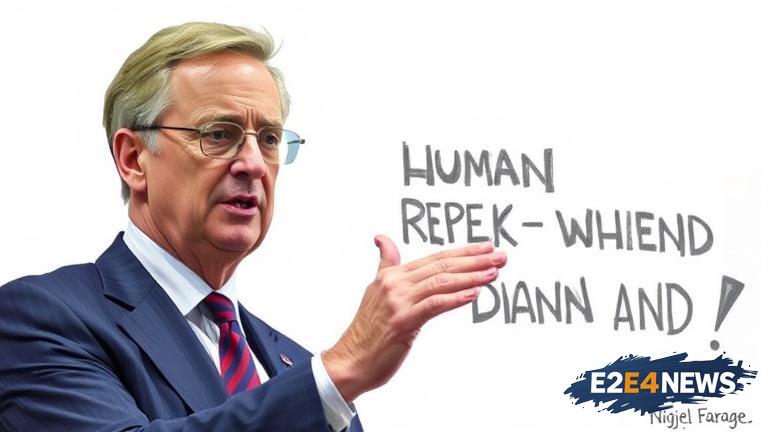Nigel Farage, a prominent British politician, has vowed to repeal the Human Rights Act if he comes to power. This move has sparked widespread concern among human rights advocates, lawyers, and citizens alike. The Human Rights Act, which was enacted in 1998, incorporates the European Convention on Human Rights into UK law, providing a framework for the protection of fundamental rights and freedoms. Repealing the Act would have far-reaching consequences, potentially undermining the rights of all individuals in the UK. The Act has been instrumental in promoting equality, justice, and human dignity, and its repeal would be a significant step backwards. Critics argue that scrapping the Act would give the government unchecked power to infringe on individual rights, leading to a erosion of trust in the government and the rule of law. The move has been condemned by human rights organizations, who warn that it would have a disproportionate impact on vulnerable groups, such as minorities, women, and children. The repeal of the Act would also have significant implications for the UK’s international reputation, potentially damaging its relationships with other countries and undermining its commitment to human rights. Furthermore, the move would likely face significant opposition from the UK’s devolved administrations, which have their own human rights frameworks in place. The Scottish and Welsh governments have already expressed their opposition to the repeal of the Act, citing concerns about the potential impact on the rights of their citizens. In addition, the repeal of the Act would likely be challenged in the courts, with lawyers and judges arguing that it would be incompatible with the UK’s international human rights obligations. The UK’s obligations under the European Convention on Human Rights would still be binding, even if the Act is repealed, and the government would be required to ensure that its laws and policies are compatible with the Convention. The move has also been criticized by business leaders, who argue that it would create uncertainty and undermine the UK’s attractiveness as a destination for investment. The repeal of the Act would also have significant implications for the UK’s data protection regime, which is currently based on the principles of the Human Rights Act. The move has been condemned by civil society organizations, who argue that it would have a chilling effect on free speech and activism. The repeal of the Act would also undermine the UK’s commitment to the rule of law, which is a fundamental principle of democracy. In conclusion, Nigel Farage’s vow to repeal the Human Rights Act has sparked widespread concern about the potential erosion of fundamental rights in the UK. The move would have far-reaching consequences, potentially undermining the rights of all individuals in the UK, and would likely face significant opposition from human rights organizations, devolved administrations, and the courts. It is essential that the government prioritizes the protection of human rights and upholds the principles of the Human Rights Act, rather than seeking to undermine them. The UK’s human rights framework is a vital component of its democracy, and any attempts to erode it would be a significant step backwards. The government must ensure that any changes to the Human Rights Act are made with careful consideration and consultation, and that the rights of all individuals are protected and respected. The repeal of the Act would be a betrayal of the UK’s commitment to human rights and would have significant implications for its international reputation. It is essential that the government prioritizes the protection of human rights and upholds the principles of the Human Rights Act, rather than seeking to undermine them. The move has been condemned by human rights advocates, who argue that it would have a disproportionate impact on vulnerable groups, such as minorities, women, and children. The repeal of the Act would also undermine the UK’s commitment to equality and justice, which are fundamental principles of democracy. In addition, the move would likely face significant opposition from the UK’s devolved administrations, which have their own human rights frameworks in place. The Scottish and Welsh governments have already expressed their opposition to the repeal of the Act, citing concerns about the potential impact on the rights of their citizens. The repeal of the Act would also have significant implications for the UK’s relationships with other countries, potentially damaging its reputation as a champion of human rights. The move has been criticized by business leaders, who argue that it would create uncertainty and undermine the UK’s attractiveness as a destination for investment. The repeal of the Act would also have significant implications for the UK’s data protection regime, which is currently based on the principles of the Human Rights Act. The move has been condemned by civil society organizations, who argue that it would have a chilling effect on free speech and activism. The repeal of the Act would also undermine the UK’s commitment to the rule of law, which is a fundamental principle of democracy. The government must ensure that any changes to the Human Rights Act are made with careful consideration and consultation, and that the rights of all individuals are protected and respected. The repeal of the Act would be a betrayal of the UK’s commitment to human rights and would have significant implications for its international reputation. The move has sparked widespread concern among human rights advocates, lawyers, and citizens alike, and it is essential that the government prioritizes the protection of human rights and upholds the principles of the Human Rights Act, rather than seeking to undermine them.




